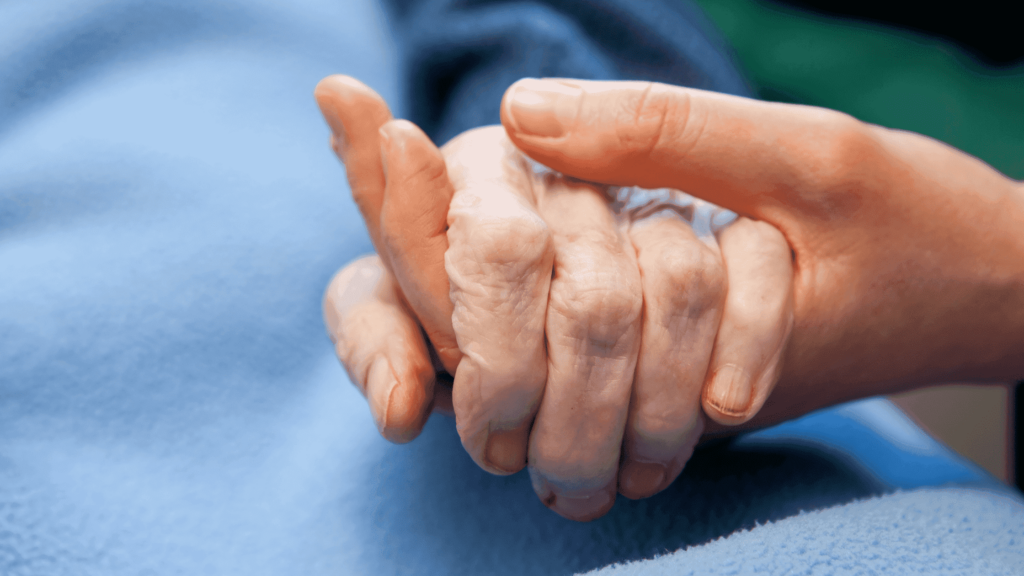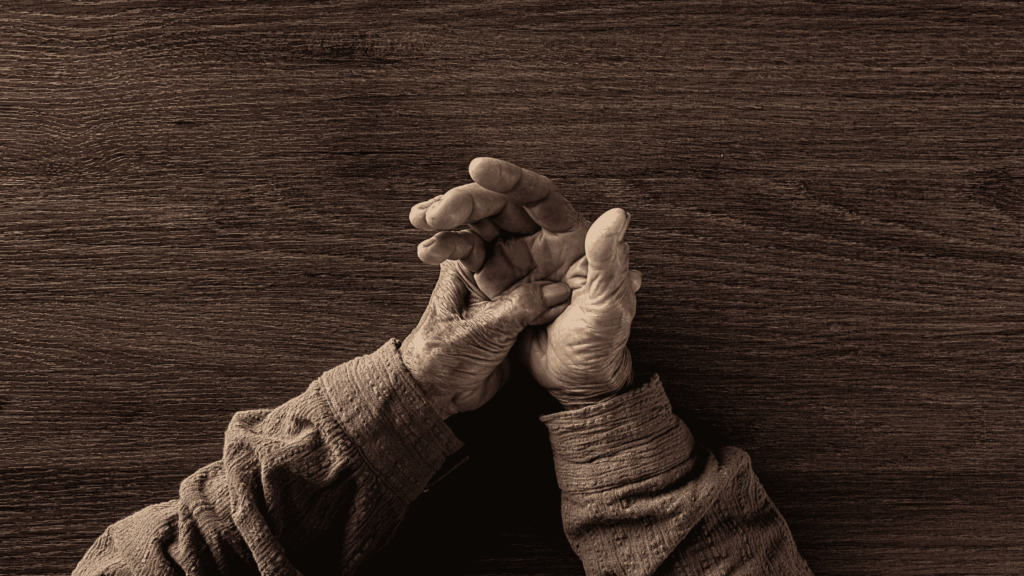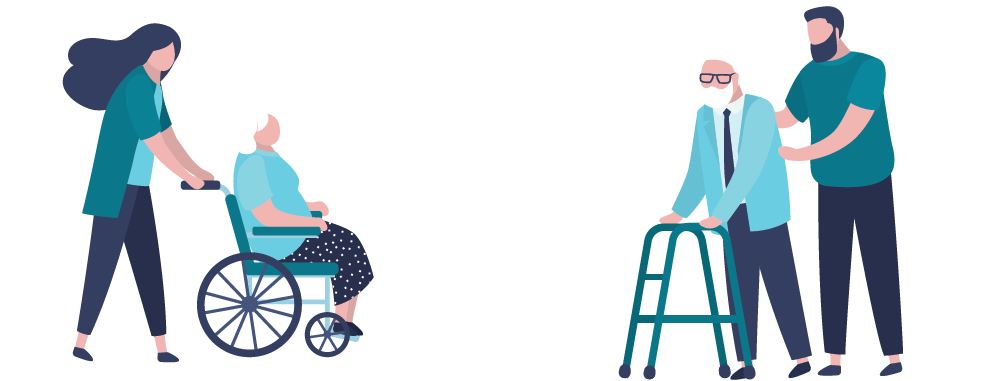© 2024 Apreva Hospice
All Rights Reserved
All Rights Reserved

Caring for a loved one on hospice care can be a challenging and emotional experience. One of the biggest concerns for families is often pain management. Here’s what you need to know about pain medications at the end of life, dispelling common misconceptions and empowering you to make informed decisions for your loved one.
Hospice care focuses on comfort and quality of life for people in the final stages of a serious illness. It’s NOT about hastening death, but about ensuring dignity and alleviating suffering. Pain medications play a crucial role in achieving this goal.
By understanding the role of pain medications in hospice care and addressing common concerns, you can make informed decisions and ensure your loved one receives the comfort and support they deserve during this sensitive time.
More than 1.7 million patients received hospice care annually in the United States. In the hospice setting, narcotics, often known as opioids, play an essential role in relieving pain and shortness of breath for our loved ones with a terminal illness. The use of narcotics in hospice care is generally safe and effective. However, healthcare providers, patients, and their families must understand the potential risks of using these medications.
Narcotics offer many benefits, including the management of severe pain and shortness of breath that hospice patients often experience. Decreasing pain and discomfort can significantly improve their quality of life in several ways, allowing them to engage more fully in everyday activities. Available dosage forms include tablets, liquid, patches, and injections, allowing for flexibility based on each patient’s needs.

While opioids can be highly effective in controlling pain, side effects can also negatively impact the patient’s quality of life. Common side effects to consider are sedation, constipation, nausea, and confusion. Constipation caused by opioid medications is extremely common and can sometimes limit the use of higher doses that may be needed to successfully manage pain.
Because all narcotics cause constipation, this is a significant side effect that we must address. Unlike other gastrointestinal side effects from narcotics, which may improve over time, opioid-induced constipation is persistent. Without a proactive bowel regimen, constipation can become chronic, increasing the risk of complications such as bowel obstructions.
A bowel obstruction occurs when a blockage in the intestine prevents the normal movement of food and waste through the digestive system. Narcotics can slow the movement of the intestines, leading to a buildup of food and waste. This may eventually cause a blockage. Fortunately, bowel obstructions in hospice care are relatively uncommon, occurring in about 3% to 5% of patients.
A bowel regimen typically includes the use of stimulant or osmotic laxatives, stool softeners, and dietary changes to help prevent and manage constipation. Stimulant laxatives can help stimulate bowel movements, while stool softeners can help soften the stool, making it easier to pass. Increased fluid intake and dietary fiber can also promote regular bowel movements.
A bowel obstruction in a hospice patient can be a serious condition. If left untreated, a bowel obstruction can lead to complications such as bowel perforation, infection, or sepsis, which can be life-threatening.
The common symptoms of a bowel obstruction include:
Managing bowel obstructions in hospice patients can be challenging. Treatment should include a multidisciplinary approach that focuses on providing comfort and relieving symptoms. In some cases, surgery may be needed to remove the blockage, but this is often not possible in hospice patients due to the risks involved.

Non-surgical treatments are typically used to decrease the degree of blockage, stimulate the bowel, and manage symptoms. These treatments may include the following:
The use of narcotics in hospice care is an essential part of managing pain and improving the quality of life for patients with a terminal illness. While bowel obstruction is a hospice patient is a serious condition, the use of a consistent bowel regimen is an important step in reducing this risk. Clinicians and caregivers alike must be aware of the signs of bowel obstruction in hospice patients and, if they suspect a problem, seek medical attention quickly. By promptly recognizing and treating bowel obstructions, we can alleviate symptoms and improve patients’ comfort in their last days.


Hospice care offers significant benefits for patients with advanced PD, providing expert symptom management, holistic support, and respect for patient autonomy. An early referral can enhance quality of life and support families during this sensitive phase. Collaboration between physicians and the hospice team optimizes care transitions and ensures informed decision-making for patients and families.
Please contact us to learn more about how we can support you and your patients who need the extra level of care that hospice provides.
As medical professionals, we are committed to providing excellent care and support for our patients. This is especially true when caring for patients with advanced cancers like end-stage colon cancer. In these challenging times, hospice care becomes crucial by offering comfort, dignity, and quality of life that extends beyond just the last days.
Understanding how hospice care can be a valuable resource is vital for helping your patients with end-stage colon cancer.

Hospice care is recommended for patients with advanced, life-limiting illnesses — focusing on quality of life and comfort in their final stages. Managing symptoms and upholding patient dignity are central to our approach. Typically, hospice care begins when a patient has less than six months to live, involving discussions among the patient, their family, and their primary care doctor.
Contrary to misconceptions, hospice care ensures a quality life in the illness’s last stages, offering patients the option to resume active treatment if desired. Primary care doctors play an integral role in initiating and guiding these discussions, especially when other treatment options are no longer viable.
Sam, a 68-year-old patient with end-stage colorectal cancer, had advanced to the point where options for treatment were no longer possible. Sam, in collaboration with his family and primary care physician, chose hospice care to treat his condition. This decision allowed Sam to receive pain and symptom management in the familiar surroundings of his home, making his final months as peaceful and comfortable as possible. Hospice care also provided emotional support to Sam and his loved ones, guiding and comforting them through this difficult journey. As a result, Sam’s final months were marked by meaningful moments and the warmth of home, providing a dignified and compassionate end-of-life experience.

End-stage colon cancer can be extremely challenging for patients and their families. As the disease progresses, patients like Sam may experience complex symptoms and significant emotional and psychological stress. Here is how hospice can benefit your patients:
Choosing hospice care for patients with end-stage colon cancer is about prioritizing comfort and quality of life. It’s about redefining hope — focusing on family connections in a peaceful end-of-life experience. Doctors often recommend hospice care, like in Sam’s situation, to keep patients comfortable and supported in their final months. This decision helps the patient and makes it easier for healthcare providers. It ensures patient and family satisfaction.

National Nutrition Month offers a unique opportunity to explore the intersection of nutrition and mindfulness. Mindful eating is about more than what we eat; it’s about how we eat, bringing full attention to the experience of nourishment and the act of caring for the body. This practice is particularly beneficial in home health care or hospice care, where certain physical conditions may hinder the basic joy of eating.
Eating is as essential of a bodily function as breathing. Since we use the breath as a source of mindfulness, then it’s only natural to extend that awareness to other human functions, like eating.
Mindful eating is an approach that involves being fully present during meals, paying attention to the taste, texture, and aroma of food. Instead of thinking of the inaccessible past or the imaginary future, the practice calls on focusing awareness on eating and eating only.
Is there a specific sensation you can notice while eating or drinking that you’ve never noticed before? Perhaps it’s a particular taste. Maybe it’s the food or water making its way through your body. Simply notice any sensations that arise.
Mindful eating transforms routine meals into sources of pleasure and comfort, creating a deep connection between body and mind. It also provides a fresh perspective to alleviate negative thought patterns, fostering gratitude for easy access to food—a relatively recent achievement for humanity.

Adapting to the changing nutritional needs is crucial. Mindfulness helps in recognizing these changes without judgement, allowing caregivers to adjust meals according to preferences and needs, while still maintaining nutritional balance. This approach respects the patient’s bodily cues and enhances their sense of control and dignity.
Developing awareness of how certain foods impact your well-being is a key aspect of mindful eating. Start by paying close attention to how you feel after consuming different foods. Notice any changes in your energy levels, mood, digestion, or even sleep patterns. Does a particular food leave you feeling energized or sluggish? Do you experience a sense of calm or, conversely, agitation?
Keeping a simple food diary can be incredibly helpful in this process. In it, jot down what you eat and any physical or emotional responses you observe. Over time, patterns will emerge, guiding you towards foods that truly nourish and benefit your body and mind, and away from those that don’t align with your well-being.
Overall, knowing what to eat can be complicated, but Dr. Andrew Weil’s approach is quite simple: try to eat the rainbow. This means diversifying your diet with vibrant, colorful foods to ensure a variety of nutrients, health-protective phytonutrients, fiber, enjoyment, and balance.

The environment where one eats can significantly affect their experience. Creating a calm, pleasant dining atmosphere can encourage mindfulness and enhance the enjoyment of meals. Simple changes, such as reducing distractions, playing soft music, or using visually appealing tableware, can make a big difference. Of course, everyone is different, so change your environment to whatever makes you happy!
We invite you to embark on this journey of mindful eating, whether for yourself or in your caregiving practices. It’s an opportunity to transform everyday meals into moments of presence, gratitude, and joy.
Why not begin today? With your next meal, take a moment to fully engage with your food. Observe its colors, smell its aromas, and savor each bite. Notice how this simple act can change your experience of eating.
Patient Safety Awareness Week provides an opportunity to focus on the critical issue of patient safety, particularly in Skilled Nursing Facilities (SNFs), Assisted Living Facilities (ALFs), and Home care/Hospice environments. These settings, catering to some of the most vulnerable populations, require specific safety protocols to protect residents and patients. This article aims to touch on some of the key safety measures that need to be accounted for and best practices for these care environments, ensuring the safety and well-being of residents, patients, and loved ones.
Each of these settings presents unique challenges and risks. In SNFs and ALFs, residents often face mobility or cognitive impairments, increasing the risk of falls or medication errors. In home care and hospice settings, the variability of the home environment and the need for family involvement in care add layers of complexity to maintaining safety standards.

In all of the settings, effective medication management is critical. This includes accurate medication administration, monitoring for adverse reactions, and coordination between various healthcare providers. Utilizing medication management technologies and involving caregivers and family members in the process can significantly reduce medication errors. Possibly leading to unwanted issues. Being aware of the adverse reactions can be simple, but it’s important to learn to recognize them.

Fall prevention is a major concern in SNFs and ALFs. Implementing regular risk assessments, modifying environments to ensure safety (e.g., installing grab bars, ensuring adequate lighting), and using mobility aids are essential measures for all residents. In home care settings, similar issues persist, however the additional need to assess the home environment and educate family members on fall prevention strategies are equally important. Caregivers and family members are usually with the patients longer than you are and ensuring they have the proper tools and education for safety is not always prioritized.

Infection control protocols are vital, especially in communal living environments like SNFs and ALFs, and for home care patients with weakened immune systems. In settings where patients interact with each other or are close by leads training in hand hygiene, proper use of PPE, and stringent cleaning protocols can help prevent the spread of infections. It’s easy to forget until it’s too late, then you will never forget again. to higher risks of infections spreading.

Emergency preparedness is crucial, particularly in SNFs and ALFs. This includes having evacuation plans, ensuring staff are trained for emergencies, and having adequate supplies and backup systems in place. In home care settings, creating a personalized emergency plan for each patient, involving caregivers, is essential. This could involve the best course of action for EMS to access the patient or evacuation safety from the residence.

All of these listed in the article require training, as this faced with not only an emergency, but a small decision to wash your hands or infection control could save someone’s life. Continuing education although healthcare providers view them as another thing on our to do list sometimes or something to cross off, it is to ensure the safety of yourself and others.

Educating patients and families about safety measures, care plans, and what to expect in these settings allows them to participate actively in the care process and gives them a chance for them to advocate for their safety and well-being. This isn’t a job for them, it’s their life.
Patient Safety Awareness Week serves as a reminder of the continuous need to prioritize safety in these settings. By focusing on specific risks, developing tailored strategies, and involving caregivers, families, and patients, we can create safer environments for the ones we care for. Let’s use this week to recommit to the highest safety standards and to recognize the dedication of those who work tirelessly to provide safe, compassionate care. The patients will thank you.
Mathew Kovalchick, DPT, OCS
ESRD happens when your kidneys are no longer able to work at the required level that is needed to sustain life. Renal disease is classified in stage 1 through 5. When your classification is 5, your kidneys function poorly and they are not able to remove the waste products in your blood.
In most cases, renal disease is caused by other health problems such as diabetes, high blood pressure, and genetic diseases. Sometimes your kidneys may stop working suddenly after suffering a heart attack.
While not all signs and symptoms may occur – below reflects common signs and symptoms:

The patient has 1 and either 2 or 3. Documentation of conditions in #4 support hospice eligibility.
AND
OR

** Creatine Clearance Calculation
(140 – age in years) x (weight, in kg) – 72 x (serum creatine in mg/dl)
Multiply answer by 1 for men and by 0.85 for women
The absence of one or more of these findings, comorbidities may also support eligibility for hospice care.
The patient has 1 and either 2 or 3. Documentation of conditions in #4 support hospice eligibility.
AND
OR
Some patients can head home after an office visit or hospitalization, pick up their prescriptions, and manage follow-up appointments and care. Others may need a lot more help. When they do, medical social workers can provide valuable insight and access to resources. Whether patients need home health services or end-of-life care, social workers are uniquely equipped to find and arrange the support they need.
Columbia University pioneered the first social work class in 1898. Since then, social workers have advocated for those in need. Trailblazing social workers have won the Nobel Peace Prize, sat on presidential cabinets, and served in Congress.
Throughout history, social workers have fought for civil rights and promoted the equal treatment of vulnerable populations. In our practices, hospitals, and patient homes, social workers make it their mission to connect our patients with the services they need.

When a patient needs home health, the number of “cooks in the kitchen” can overwhelm any busy clinician. An experienced social worker can take the reigns and coordinate between all parties.
They understand the intricacies between our patients’ health insurance, home health providers, and individual needs and can take this task from our plate. Social workers manage pre-authorizations, choose an appropriate home health agency, and work closely with patients and their families to discuss their options.
Social work professionals also assess our patients’ safety for discharge. They ensure their home is accessible and they have the support system to follow their care plan when a home health professional isn’t there.
Some social workers help our patients get set up with home health from the hospital or office. However, others work for home healthcare companies. In this setting, they can manage our patients’ needs at home and ensure they receive the most appropriate level of care. Social workers may be our patients’ first call with questions, and they can offer advice on resources and the coordination of their health needs.
End-of-life care can take many forms. Some of our patients require palliative care with pain control and a once-weekly nursing visit. Others may need more frequent visits and other types of care, such as help with activities of daily living. While we may want our patients to get all the bells and whistles, a social worker’s input can help the healthcare team and patients figure out what they would like, what they need, what insurance will cover, and any out-of-pocket expenses.
Once we establish a hospice, a social worker employed by that service has much to offer patients. They can serve as counselors, listening to concerns and troubles. Social workers can help patients and their families cope with many challenges: emotional, social, and practical.
Our patients’ communities may offer resources for their citizens nearing the end of life, and a social worker can alert them to these opportunities. As our patients’ families cope with their loved one’s situation, social workers offer support for grief and bereavement.
Social workers help a myriad of patients from all walks of life. As such, they hold a unique perspective that helps to fill in any cracks left by other medical disciplines. Used in conjunction with other members of the healthcare team, social workers can add vital expertise and vastly improve our patients’ outcomes.
